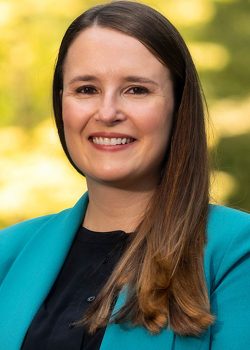Bringing the world’s best to Carolina
International Student and Scholar Services helps University departments and schools hire, recruit and enroll faculty, staff and students from around the world.

Traveling thousands of miles to study or work at Carolina sometimes isn’t the hardest part of an international student or scholar’s journey to Chapel Hill. For some, the hardest part is navigating the complexities of the U.S. immigration system.
Fortunately, the immigration experts in the University’s International Student and Scholar Services are fully equipped to help those individuals and Carolina’s departments with the process.
In pre-pandemic years, the number of Carolina students, faculty and academic staff (postdoctoral fellows and research scholars) from other countries remained steady. Most were in the United States with nonimmigrant status to study, teach or conduct research. In fiscal year 2019-20, 1,254 international scholars were on campus with 847 of those being J-1 Exchange Visitors. They worked in biological and physical sciences, city and regional planning, social sciences, journalism, business, mathematics, statistics, computer science and many other disciplines.
That same year, Carolina’s 2,400 international students came from more than 100 countries and included 1,011 graduate students, 741 undergraduate students and 260 non-degree exchange students. Another 388 Carolina students engaged in Optional Practical Training, which permits off-campus employment for the purpose of gaining practical experience in the student’s major field of study.
Ioana Costant is the ISSS director. An immigration attorney, she has lived in Colombia, the Netherlands, Brazil and Belgium and speaks Dutch, Spanish and Portuguese. Costant offers the Carolina community her unique combination of experiences in other countries, expertise in immigration law and understanding of how international students and scholars contribute to making Carolina a global campus.
The Well asked Costant about the latest news that campus units and Carolina’s international community should know about.
What role does ISSS serve and how can campus units best work with your team?
ISSS maintains Carolina’s compliance with federal immigration regulations. It’s the sole authority for processing UNC-sponsored immigration benefits and for immigration advising for international students, scholars and faculty. Our staff offers tremendous depth of expertise on international student and scholar visa regulations and immigration law.
We are a resource not only for international students and scholars, but also for staff and faculty and other campus stakeholders. We enable UNC to bring in the best and brightest students, scholars and faculty from around the world who support the University’s teaching, research, and public service mission as a leading global public research university.
Each staff member has gone through a process to be federally authorized by the government to process UNC-sponsored benefits and legally obligated to meet federal reporting requirements. On a daily basis, we interact with federal agencies like United States Citizenship and Immigration Services, the Department of Labor, the Department of State and the Department of Homeland Security. Compliance is critical. That’s why we offer advising and training and guidance.
What risks could units face by not complying with immigration laws, regulations and requirements?
The range of risks is wide. It’s anywhere from hurting Carolina’s reputation to monetary damages, but there is also jeopardizing or eliminating Carolina’s ability to welcome international students, scholars and faculty. Ultimately, what is at stake is our students’ ability to develop global competencies right here on campus and our ability to hire the best and brightest from around the globe, which is necessary to continue as a leading global public research institution. So the stakes are really high.
Immigration can get complicated, and we are here to help and to make things as simple and streamlined as possible.
Among the services and tools that ISSS offers, what is the J-1 Playbook and why should campus units rely on it?
In a typical year, the University hosts upwards of 950 incoming and continuing J-1 Exchange Visitors from around the world, and ISSS provides support to each person. Our J-1 Exchange Visitors join units across campus in diverse fields of specialization ranging from biomedical sciences to education.
The playbook is a comprehensive online resource for faculty and staff who serve as J-1 Exchange Visitor hosts and provides guidance on the University’s J-1 Exchange Visitor Program. It will help all immigration stakeholders at Carolina maintain federal compliance.
The Operational Excellence team partnered with the Office of the Vice Provost for Global Affairs and, specifically, with ISSS to streamline and improve the J-1 Exchange Visitor Program at the University. The design team, with stakeholders from the School of Medicine, the Gillings School of Global Public Health, College of Arts & Sciences and many other schools on campus, worked together on the playbook for 16 weeks.
In July, a message from the provost and vice provost for global affairs told faculty and staff who serve as J-1 hosts about the playbook’s release. (The playbook website is scheduled to be live later this week.) We’re launching online training sessions for J-1 hosts to ensure the campus can use the playbook to its fullest.
What do international students and scholars need to know now for the rest of 2021 and into 2022?
The tremendous uptick in immigration changes over the last few years has been demanding and challenging.
Starting in the fall of 2021, we will see many of our international students returning to campus for the first time since the start of the pandemic. Because of travel restrictions and limited U.S. consular services in many countries due to the pandemic, UNC’s international students and scholars have had difficulty obtaining visas and traveling to the United States. But this summer, consular services resumed in many countries and prioritized international students. Also, the federal government created an exception to the travel restrictions for international students and certain scholars. We are excited to welcome them to Chapel Hill.
At the same time, visa processing has not resumed at the same pace in all locations because of substantial backlogs, reduced staffing and, in some countries (such as India), new COVID surges. Commercial flights have limited availability, too. Unfortunately, the impact of the backlogs will be felt well into 2022. So, the situation continues to evolve.
Some of our international students and scholars have remained in Chapel Hill throughout the pandemic because of travel restrictions and visa issues, which has been a hardship to many of them and their families.
Globalizing the University is one of the eight pillars of Carolina Next. How do people in Carolina’s international community contribute to this initiative?
International students and scholars enrich the life of our campus in many ways. They bring different perspectives from diverse communities around the world. This rich diversity enhances classroom learning and research discoveries and infuses campus with a global mindset.
It is also important to recognize the extent to which international students and scholars contribute to UNC’s core research and teaching objectives. For example, international graduate students work in labs assisting faculty with research. They also are teaching assistants in many courses, and their experiences benefit Carolina students.
Our domestic students who have not been able to study abroad (as well as those who have) benefit by interacting with students and scholars from other countries. Taking advantage of those opportunities can help them develop global skills and knowledge. That’s key to future success in whatever career they pursue.
Our international visitors learn about Carolina, the United States and the South, which helps them tell their peers and colleagues back home about their experiences. Even with Carolina’s top rankings, it may be a hidden gem waiting to be discovered through word of mouth.





